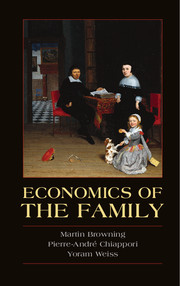Book contents
- Frontmatter
- Contents
- List of Tables
- List of Figures
- Acknowledgments
- Introduction
- PART I MODELS OF HOUSEHOLD BEHAVIOR
- 1 Facts
- 2 The Gains from Marriage
- 3 Preferences and Decision Making
- 4 The Collective Model: A Formal Analysis
- 5 Empirical Issues for the Collective Model
- 6 Uncertainty and Dynamics in the Collective Model
- PART II EQUILIBRIUM MODELS OF THE MARRIAGE MARKET
- Author Index
- Subject Index
3 - Preferences and Decision Making
Published online by Cambridge University Press: 05 July 2014
- Frontmatter
- Contents
- List of Tables
- List of Figures
- Acknowledgments
- Introduction
- PART I MODELS OF HOUSEHOLD BEHAVIOR
- 1 Facts
- 2 The Gains from Marriage
- 3 Preferences and Decision Making
- 4 The Collective Model: A Formal Analysis
- 5 Empirical Issues for the Collective Model
- 6 Uncertainty and Dynamics in the Collective Model
- PART II EQUILIBRIUM MODELS OF THE MARRIAGE MARKET
- Author Index
- Subject Index
Summary
Preferences
In Chapter 2 we informally reviewed the gains from marriage in some generality. The existence of potential gains from marriage is not sufficient to motivate marriage and to sustain it. Prospective mates need to form some notion as to whether families realize the potential gains and how they are divided. In this chapter we consider these issues in a very specific context. The context is a two-person (e.g., woman a and man b) household in which the only (static) decision is how much to spend on various market goods that are available at fixed prices, given fixed total household expenditure on all goods. Although very special, this context allows us to discuss formally many of the issues that will be used in other contexts in later chapters.
Some commodities are private and some public. Private goods are consumed nonjointly by each partner, and public goods, such as heating, are consumed jointly and nonexclusively by the two partners. In other words, private goods are characterized by an exclusion restriction property: the fact that I consume a particular apple de facto excludes anyone else from consuming the same apple. With public goods, on the contrary, no such restriction exists: that I enjoy seeing a beautiful painting on my wall does not preclude my spouse from enjoying it just as much (or even disliking it).
- Type
- Chapter
- Information
- Economics of the Family , pp. 80 - 132Publisher: Cambridge University PressPrint publication year: 2014



